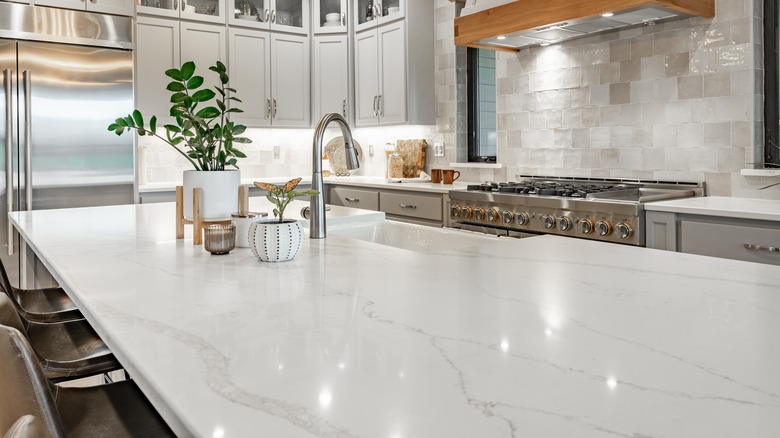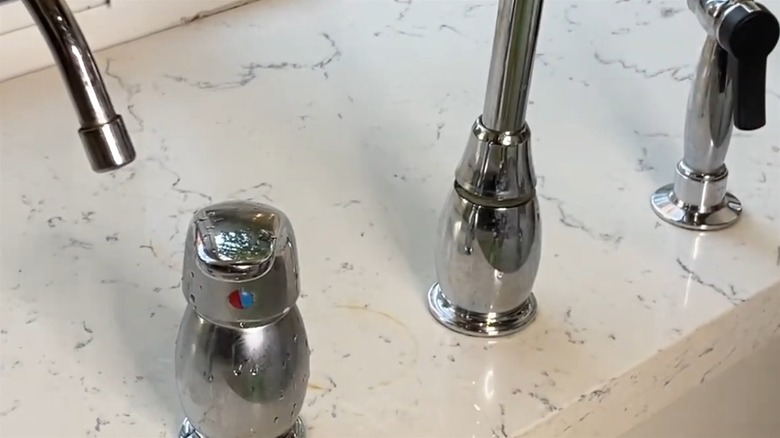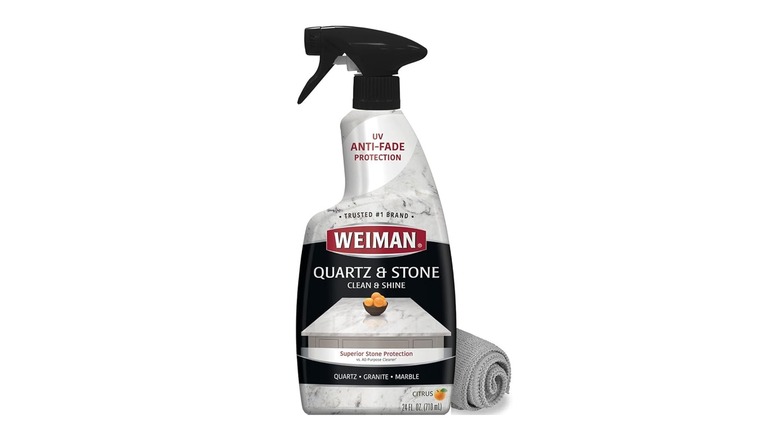How To Treat Rust Stains On Your Quartz Countertops (& Common Mistakes To Avoid)
We may receive a commission on purchases made from links.
Quartz countertops are a coveted modern luxury feature that any homeowner or tenant would be lucky to find in their new home's kitchen or bathroom space. However, this material isn't exactly low maintenance (there are at least 5 things to consider before installing quartz countertops). A bit of anxiety can easily erupt when a high-quality material like quartz starts to show imperfections like rust stains. We asked Irakli Khizanishvili, CEO and Owner of Proslit Tile & Stone, to chat exclusively with House Digest to reveal the truth about why rust stains appear on quartz countertops, how to treat them, and the most common rust removal mistakes. The good news is that rust stains can easily be removed from quartz countertops with a designated cleaning product, and you should avoid making the mistakes of using abrasive scrubbers, letting the stains sit for too long untreated, and not following the product's instructions while doing so.
If you've been struggling to remove unsightly rust stains from your gorgeous quartz countertops, don't give up and don't keep trying random cleaning solutions that could be doing more harm than good to your quartz. Instead, give these pro tips from a trusted tile a stone expert a try before your next attempt at restoring your countertops to their former rust-free glory.
Why you might spot rust on your quartz countertop
According to Irakli Khizanishvili, rust stains aren't particularly common on quartz countertops. However, they can and do happen. When they do, it is typically due to one of five causes. First up is leaving metal items sitting on the counter for more than a few minutes. "Leaving metal objects such as cans, utensils, or appliances on the countertop for extended periods can lead to rust stains," Khizanishvili exclusively explained. The expert went on to mention how chronic exposure to hard water (just one of the many horrors that hard water can cause in your home) and cleaning agents that contain metal particles are also common causes of rust stains.
Improper installation or sealing can also lead to rust staining. "Improper sealing of the joints or edges can sometimes allow moisture to penetrate and cause rust stains," Khizanishvili enlightened, adding that "if metal fasteners or supports are used during installation and not properly insulated, they can rust and stain the countertop." While improper installation or sealing may require professional attention, rust staining caused by inappropriate cleansers, water exposure, or contact with removable metal is more likely to be treatable and preventable without outside help.
Expert-approved rust removal tips and common mistakes to avoid
When it comes methods for tackling rust stains on quartz countertops, there is a clear winner, according to Irakli Khizanishvili: a specialized stone cleaning product designed specifically for quartz. "These cleaners are specifically made to tackle the types of stains that occur on quartz without harming the surface," he exclusively advised House Digest readers. "They are safe for daily use and do not contain harsh chemicals that can degrade the quartz." If you can't get your hands on a specialized cleaner, Khizanishvili recommends trying baking soda paste, diluted vinegar, or — with extreme caution — a commercial rust remover. "Always test in a small, inconspicuous area first," he urges.
The most common rust removal mistakes this expert sees? Most fall under the top 6 things you should never do if you have quartz countertops. The errors typically consist of using harsh or abrasive cleansers or scrubbers, letting rust stains remain untreated long enough to set in deeply, and failing to follow manufacturers' instructions. "Always refer to and follow the manufacturer's guidelines for cleaning and maintenance," he advised all owners of these kitchen surfaces.


